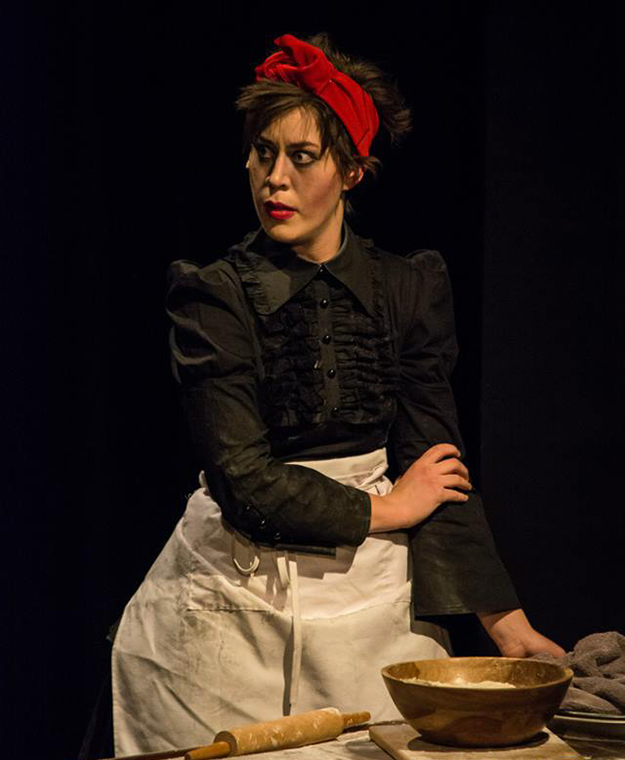Researching the dead in London, entertaining the living in Hamilton

Bringing history to life is important for McMaster PhD candidate Madeleine Mant. She starred as Mrs. Lovett in McMaster Musical Theatre’s production of Sweeney Todd: The Demon Barber of Fleet Street earlier this year (pictured), and also took part in in this year’s Quarantine Tent event during Hamilton’s Open Streets Festival in June.
Remember that history teacher who piqued your interest in stories about another time, another place? Hold that thought.
Now, fold in the super-sleuthing abilities of a fictional character, say, Nancy Drew.
Finally, add a really big dash of actress Sandra Bullock.
You’ll likely wind up with Madeleine Mant — a McMaster anthropology PhD candidate who takes centre-stage when it comes to graduate research, is obsessed with 18th century skeletons and has a passion for live theatre.
Her primary research involves perimortem trauma — injuries happening around the time of death, without any evidence of healing — in hospitals in England during the 1700s.
This unique field of study garnered her a three-year Vanier Scholarship. The award is the most prestigious federal scholarship offered to graduate students in Canada.
The Vanier Scholarship allowed Mant to spend a full year in the field, where she examined more than 1,000 sets of skeletal remains at the Museum of London Centre for Human Bioarchaeology and combed through a cache of records from London hospitals and cemeteries.
When Mant crossed the ocean armed with a digital microscope, she was focused on the fracture prevalence of those people who had made their way to one of the city’s seven voluntary hospitals of the day. But somewhere along the line, the first-hand accounts from doctors and patients — found in a cache of hospital and cemetery records — spoke to her.
“What makes it exciting, for me, is that we can examine human choice in the health care from the past,” says Mant. “For example, we have a description of a woman coming in with an injury, and we have it in her words. How brilliant is that?”
Mant’s bioarcheological project has resulted in the amplification of voices often missing from historical texts and written histories of the working poor of England’s pre- and early Industrial Revolution. These were people who may have been literate, but had little opportunity to record their stories.
“It’s so difficult to access this information and pull it all together. I have had the privilege of piecing together the evidence found in the bones with the written records,” she says.
Mant believes it’s a historical perspective that deserves more study.
Walking the streets of London, sometimes the very same routes as those individuals in the hospital records, helped to create a picture for the McMaster PhD candidate — one of congested streets, difficult-to-manoeuvre-in clothing and everyday dangers to pedestrians, such as the horse-and-carriage.
Living history:
Bringing stories to life is just as important to Mant. As an undergrad, she worked at a local living history museum in Edmonton, Alberta, doing outreach in full period costume. Now, she performs on stage as part of McMaster Musical Theatre. In 2016, she will portray The Drowsy Chaperone in the musical by the same name.
Once she completes her doctorate next year, Mant isn’t sure where life will take her. Perhaps she’ll search out more voices from the past. Maybe she’ll look to teaching or writing as a way to get people interested in history because “it belongs to us all.”
Whatever the future brings, Mant is sure of one thing.
“If I can wear a costume at least one day a week, no matter what I’m doing, I will be happy.”
